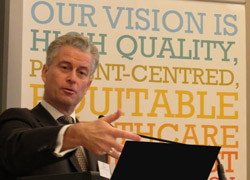E-Health at a glance with the EPF seminar
 70 patient leaders from all across Europe attended the seminar EPF organised on e-Health on 23 January in Brussels. This event was an excellent opportunity to explore advances and the ‘state of the art’ on patient involvement in this area at both policy and operational level. It clearly emerged from the discussions that patients do want to be more involved in e-Health policies as well as in the design, implementation, and assessment of this innovative type of services.
70 patient leaders from all across Europe attended the seminar EPF organised on e-Health on 23 January in Brussels. This event was an excellent opportunity to explore advances and the ‘state of the art’ on patient involvement in this area at both policy and operational level. It clearly emerged from the discussions that patients do want to be more involved in e-Health policies as well as in the design, implementation, and assessment of this innovative type of services.
EPF was extremely pleased to welcome Mr Robert Madelin, Director General of DG Connect (European Commission) as a key note speaker as well as various other speakers who illustrated existing e-Health strategies, services, and policies. They explored how needs and expectations of patients can be better taken care of right from the onset.
Numerous e-health-related projects have taken place over the past few years with a view to also gathering evidence based information of patients’ views and needs in this area.
The seminar was the occasion to introduce some of them:
- Nicola Bedlington (EPF) provided an overview of the results of the recently-published "Chain of Trust" project report on patients’ and health professionals’ perspective on telehealth with a focus on building trust and acceptance;
- Silvia Mancin (Arsenàl, Italy) presented the Renewing Health project piloting innovative telemedicine services in 9 regions where EPF is involved as associate partner.
- Josu Xabier Llano Arnaiz introduced the SUSTAINS project on large-scale deployment of patient-accessible Electronic Health Records from the point of view of his region, the Basque Country; where EPF is also participating as associate partner.
Ms. Kollitsi, from the e-Health Governance Initiative, provided patient leaders with an overview of EU-level e-Health existing policies. Mr. Abeloos from DG Connect reiterated the importance of the e-health Action Plan that summarises the EC vision in this domain highlighting opportunities for patient involvement. Peeter Ross, from e-Tervis - Estonian e-Health Foundation, and Ms. Bullot, from the Assembly of European Regions, completed this overview with bringing respectively the national and regional perspectives.
Workshop sessions brought to light the potential contribution of e-Health to patient empowerment. The question of how e-Health affects the patient health-professional relationship was also explored. Specific attention was paid to existing methodologies for assessing patient-outcomes in e-Health and how patients themselves can become involved in this crucial area.
“There won't be a day we wake and all is e-health. Like the stethoscope, it took centuries for it to become a tool for every doctor. But ICT should grow to make e-health mainstream in healthcare. We have to be patient!" concluded Robert Madelin, Director General of DG CONNECT.
Ms. Bonfiglioli from Microsoft introduced the idea of the setting up a multi-stakeholder platform on e-Health literacy. She will soon prepare a draft to further explain the concept and the EPF board will explore this to see how this can address some of the fundamental issues regarding training, support and skills building for patients to be able benefit from e-Health to the optimum.
A full seminar report will be drafted and disseminated soon. In the meantime, all of the presentations can be found on the EPF website.
For more information, please contact Walter Atzori, Senior Programme Officer
